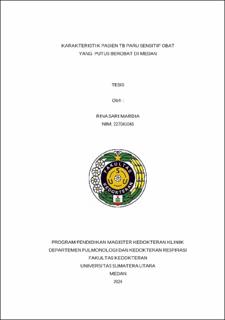| dc.description.abstract | Background: Tuberculosis (TB) is a chronic infectious disease caused by Mycobacterium tuberculosis. Adherence to TB treatment is a complex and dynamic phenomenon with various interacting factors. The characteristics of patients lost to follow-up treatment include social, clinical, and economic characteristics.
Objective: To identify the characteristics of drug-sensitive pulmonary TB patients lost to follow-up treatment in Medan.
Method: This research is a descriptive study using a cross-sectional approach. All variables were measured and observed at a time during the study. The study was conducted at RSUP Adam Malik Medan and Prof. Dr. Chairuddin P. Lubis USU Hospital in patients with lost to follow-up TB who have been diagnosed bacteriologically that meet the criteria of inclusion and exclusion. This study uses data from medical records and questionnaires. Independent variables include age, gender, educational level, employment, marital status, family history of lung tuberculosis, attitudes to TB treatment, social support, health services, and reasons for discontinuing the treatment.
Results: Out of 40 patients with lost to follow-up pulmonary tuberculosis, the majority were patients in the age range of 45-65 years (n=26.65%), male (n=31.77,5%), equal level of high school education (n = 24.60%) had a fixed job (n="33.82.5%), marital status (n"=33.90%), had no family history of lung tuberculosis (n=36.90%), poor attitude to TB treatment (n=36.90%), received low social support (n=51.52,5%), and received less supported health care services (n<33.82,5%). Reasons patients TB SO quit taking medication presented in this study vary, among others due to the side effects of TB drugs, patients choose herbal drugs, already feel healthy, laziness consuming TB medication, patient are embarrassed with pulmonary TB disease, can not take lung TB drugs because no one carries or has no transportation costs.
Conclusion: The majority of patients with drug-sensitive pulmonary tuberculosis who quit their medication in the fields are between 46 and 65 years of age, male sex, high school graduates of equal degree, have a fixed job, marital status, have no family history of TB, have an inferior attitude to TB treatment, receive low social support, and receive less supportive health services. Reasons for discontinuing treatment for SO TB patients vary, including TB drug effects, clinical, and economic. | en_US |


